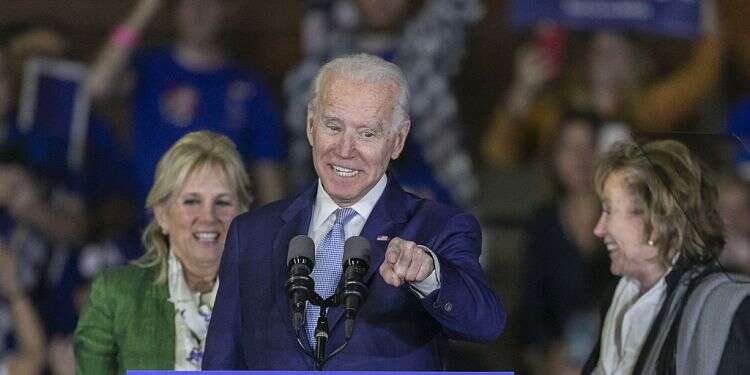The search for a Democrat to challenge Republican President Donald Trump in the Nov. 3 election narrowed on Wednesday to a choice between Bernie Sanders and Joe Biden, who staged a comeback in Super Tuesday voting to become the undisputed standard-bearer of the party's moderate wing.
Biden won 10 of the 14 states up for grabs on Tuesday, including delegate-rich Texas. The former vice president roared ahead in the overall tally of delegates who will choose a presidential nominee at the Democratic convention in July.
Follow Israel Hayom on Facebook and Twitter
His strong performance ended Sanders' status as the Democratic front-runner and led former New York Mayor Michael Bloomberg to drop out of the race.
Bloomberg on Wednesday gave up his presidential campaign and endorsed Biden, after spending hundreds of millions of dollars of his own money on ads across the United States. But Bloomberg failed to deliver convincing results on Tuesday, the biggest day of voting in the Democratic nomination campaign with contests in 14 states across the country.
"I'm sorry we didn't win," Bloomberg, 78, told a crowd of supporters in a New York City hotel. "A viable path to the nomination just no longer existed."
He said he was endorsing Biden because he had the best shot at beating Trump. "I hope you will join me in working to make him the next president."
The media billionaire did not say whether he would spend part of his fortune to help Biden, but Bloomberg's absence from the race will help the former vice president. Both men appeal to the centrist wing of the Democratic Party.
In a tweet addressed to Bloomberg, Biden wrote: "I can't thank you enough for your support—and for your tireless work on everything from gun safety reform to climate change. This race is bigger than candidates and bigger than politics. It's about defeating Donald Trump, and with your help, we're gonna do it."
Sanders, a senator and democratic socialist who is popular with young voters, lashed out at what he said was "the kind of venom we're seeing from some in the corporate media," and attempted to draw a stark contrast between himself and Biden.
"What this campaign, I think, is increasingly about is: Which side are you on?" Sanders told a news conference in Vermont. He attacked Biden's record voting in favor of trade deals that he says had devastated parts of the Midwest, Biden's votes in favor of the Iraq war and a bankruptcy bill, and his past record on Social Security.
Speaking to reporters in Los Angeles, Biden said he did not want the primary race against Sanders to turn ugly.
"What we can't let happen in the next few weeks is let this campaign turn into a campaign of negative attacks," Biden said. "The only thing that can do is help Donald Trump."
In another move that could reshape the race, Elizabeth Warren, 70, is "talking to her team to assess the path forward," a campaign aide said.
The liberal senator, who was seeking to become the nation's first female president, had disappointing results across the board on Tuesday, including coming in third in her home state of Massachusetts.
A resurgent Biden, 77, rolled to electoral victories across the South, Midwest and New England, setting up a one-on-one battle against Sanders, who won three states and led in California, which has the biggest pool of delegates.
Biden, whose campaign had been on life support just weeks ago, registered surprise victories in Texas and Massachusetts.
Tallies after Tuesday showed Biden leading Sanders in delegates overall by 433-388. A candidate needs 1,991 delegates to win the Democratic nomination on the first ballot at the July convention.




